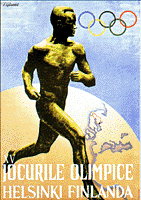HISTORY OF THE MODERN OLYMPICS
Helsinki, Finland, 1952
 |
| Olympic posters from the Archives, Olympic Museum Lausanne, from the book The Olympic Spirit, published by Tehabi Books |
Nearly 5,000 athletes competed, representing 69 nations. The track-and-field competition starred Emil Zátopek of Czechoslovakia, who won the gold medal in the 5,000- and 10,000-metre runs. He also won the gold medal in the marathon, in his first attempt ever at that event. American Robert Mathias became the first athlete to win consecutive Olympic decathlon titles. The American men, led by pole vaulter Bob Richards and 800-metre specialist Mal Whitfield, won 14 of the 23 events. The women's track competition featured the sprinting of Marjorie Jackson and the hurdling of Shirley Strickland de La Hunty, both of Australia. Soviet women, led by Galina Zybina, made a strong showing in the field events.
The 1952 Olympics saw the debut of the Soviet gymnast Viktor Chukarin, who won the first of his two individual gold medals in the combined exercises. American diver Pat McCormick won two gold medals. Swedish equestrian Henri St. Cyr won a gold medal in both the individual and team dressage competitions. The Helsinki Games saw the first gold medal for American weightlifter Tommy Kono.
Introduction * Early History * Revival of the Olympics * Organization of the Modern Games